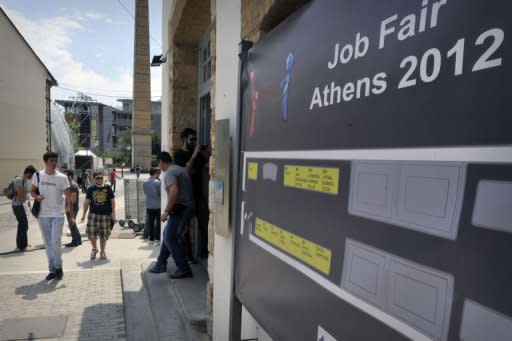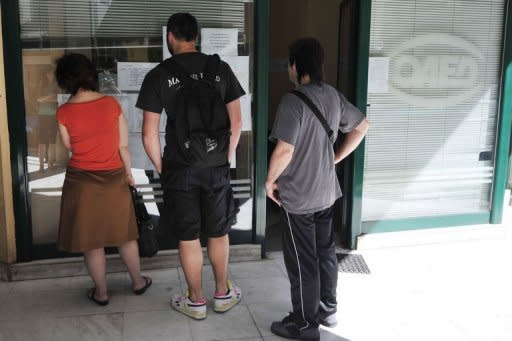Young Greek jobseekers lose hope in crisis
Waiting for his turn at the job centre, Kostas smokes a cigarette, drinks a coffee and buys a lottery ticket. This young Athenian has as much chance of winning that, he reckons, as of finding a job. One of the masses of young Greeks out of work -- the unemployment rate is 53 percent among those under 24 -- Kostas, 24, has given up hope of finding employment after a year on the sidelines. "They're supposed to help us but they don't really. We'll never find a job here," says Kostas, who like many jobseekers would not give his second name. "None of my friends ever found one here." Instead he has come to do the paper work for a computer training course which will bring him a certificate and a precious 500-euro ($628) subsidy. He queues along with other 20- and 30-somethings who take their turn to step up to the one open counter where a clerk puts a sticker on their job seeker's card, without a word. The card can help Kostas get training but does not entitle him to benefit payments -- those are only for certain categories of laid-off workers. The second floor of the job centre is meant to be where jobseekers come for career advice or to leave their CVs for potential employers to come and read. It is empty now. "The companies don't ask for anybody anymore," says one employee, who asked not to be named. "This is the case in the construction field for example. And for the technical jobs, electricians and in tourism, they have their own network" to find workers, the employee added. Resignation has set in among the young, including those older than Kostas in the 25 to 34 age bracket, where the unemployment rate is 29 percent, well above the overall rate of 21.9 percent. Nicole and Katerina, 27-year-old biology graduates who have been unemployed for two years, say they are looking to study abroad now and have given up on the job centre. "It doesn't help at all," said Nicole. "They don't have an efficient way to tell us what to do, they don't have enough time. We cannot count on them. Now it's impossible to find a job." The front window of the centre displays job adverts -- mostly for short-term home-help positions. Nothing for a young literature graduate like Maria, 22, however often she comes back to look. "I come here every week, even twice a week to look at the positions," she says. "We have no future here." As Greece struggles to get out of its financial crisis through spending cuts and economic reforms, the European Commission has promised to launch an action plan to boost youth employment by the end of this year. For this it has offered to add 200-250 million euros to the two billion euros of structural funds available to Greece to help businesses and local authorities employ young people and to boost training. This aid "can make it possible for them to re-enter the job market and help control the explosion of unemployment," said Savvas Robolis, a director of the GSEE institute. "But they do not create new jobs." For him, the answer is investment in public works projects to stimulate activity by companies currently starved of credit. Those Greeks who do find a job can expect a minimum gross salary of 508 euros or 460 euros for the under-25s. Many would rather go abroad to countries with more job opportunities, says Robolis, and according to him, 23,000 Greek graduates moved to Germany in 2011.




